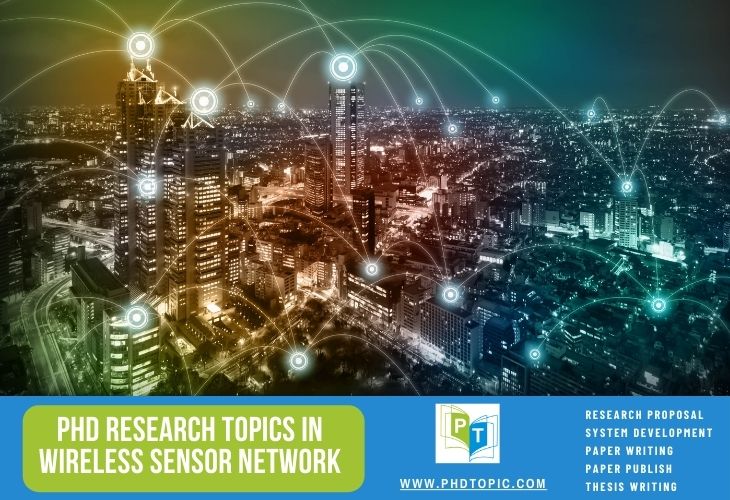Wireless sensor network (WSN) is a group of spatially dispersed and dedicated sensors for monitoring the physical conditions that prompt today’s PhD Topics in Wireless Sensor Network to work on this field. The recent mechanism and formation of these WSNs consist of a finite set of sensor nodes that gathers environmental data as well as monitor the physical conditions. Let’s grasp the idea behind the process of Wireless sensor networks.
What is the process of WSN?
Basically, a wireless sensor network consists of thousands of sensor nodes. With the aid of radio signals, these nodes can communicate among themselves. When it comes to sensor nodes they possess the capabilities of Data Processing, Better Network Communication as well as Sensing Capacity. Sensor nodes are considered to be extraordinary because of their cooperation among themselves. Thus they are responsible for self-organizing an appropriate network.
How do sensors communicate with each other?
Let’s take a look at how Wireless Sensor Networks are created,
- Sensor nodes are known for their lesser computational ability
- As they contain any number of sensors, global identification becomes impossible
- In WSN, these sensor nodes are deployed in hundreds of thousands in numbers
- Unlike conventional networks, sensor nodes are based on broadcast communication
- Frequent changes identified in the topology of WSN and these nodes are subject to failure
PhD, a great dream of many students! Our senior research members who have got a good deal of experience are geared up to make your dream come in handy. As the Wireless sensor network is concerned, it is a premier research topic to go for. PhD Topics in Wireless Sensor Network aid its full support during the research proposal of your research work.

Research PhD Topics in Wireless Sensor Network
- Blockchain technology for Security
- Sleep scheduling
- Partitioning of the network area
- Privacy and trust issues in WSN systems
These are some research ideas for your topic selection. We have much more in which you can stretch your knowledge with distinct objectives and findings to develop novel phd topics in wireless sensor network. Let’s go for metrics based on some critical issues, those are as follows,
Performance Analysis in WSN
- Temporal evaluation – concerning this issue, parameters such as reaction time and latency are made use of
- Network lifetime – it is identified via failure of the nodes and the percentage of such failure are determined
- Overhead and efficiency – identified by routing protocols such as average route, the message lost, message cost, control overhead, and so on
- Energy use – the use of energy is categorized according to its efficiency, dissipated range as well as a resource utilized for packet delivery
- Scalability – calculated the performance of a protocol b deciding the size of the network, quantity of data sources as well as node density
We are ready to comprehend this multidisciplinary research area with all its design and application. Furthermore, we unravel the constraints such as hardware, fault tolerance, power consumption, and topology change that are met by Wireless sensor networks.
ENERGY MODELS FOR WSN SIMULATION
We have listed some energy model bases for your further understanding, they are
- CSMA/CA algorithm
- Turn on mode
- Turn off mode
- Radius in reception mode
- Switching from transmission to reception
- Switching from reception to transmission
At the current time, many research scholars take WSN as their subject and they, in turn, concentrate on the design of energy as well as efficient algorithms and protocols. However, in these networks, there is a possibility to research by implementing distinct sleeping node techniques too. Further with the aid of the energy equation, the proposed model becomes easy to implement. As WSN is known for its less computational power, it is badly in need of an energy-efficient protocol. Take a look at some energy-based metrics,
What are the QoS metrics in WSN?
- Number of dead nodes
- Number of channel heads metrics
- Network lifetime
- Energy consumption
- Number of alive nodes
- Transmission power
- Transmission and receiving energies
- Cluster head lifetime
Innovation is what makes us unique among the crowd. Phd Topics in Wireless Sensor Network offer only such innovative ideas to make the students outstanding in their research work. As an additional benefit we get your research work published in standard journals such as SCI and SCOPUS indexed one at an affordable price. Stand out of the crowd by entering our exclusive service.
